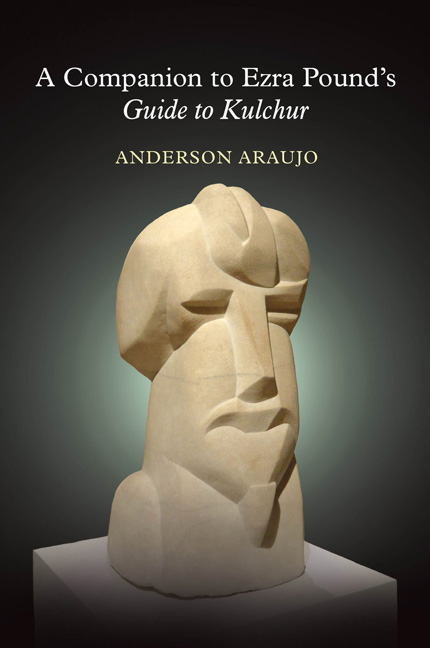Book contents
- Frontmatter
- Contents
- Acknowledgments
- Abbreviations
- Introduction
- Guide to Kulchur
- Part I
- Section I
- Section II
- Part II
- Section III
- Section IV
- Part III
- Section V
- 15 Values
- 16 Europe Or The Setting
- 17 Sophists
- 18 Kulchur: Part One
- 19 Kulchur: Part Two
- 20 March 12th
- 21 Textbooks
- Section VI
- Part IV
- Section VII
- Section VIII
- Section IV
- Part V
- Section X
- Section XI
- Part VI
- Section XII
- Section XIII
- Addenda: 1952
- Notes
- Index
18 - Kulchur: Part One
from Section V
- Frontmatter
- Contents
- Acknowledgments
- Abbreviations
- Introduction
- Guide to Kulchur
- Part I
- Section I
- Section II
- Part II
- Section III
- Section IV
- Part III
- Section V
- 15 Values
- 16 Europe Or The Setting
- 17 Sophists
- 18 Kulchur: Part One
- 19 Kulchur: Part Two
- 20 March 12th
- 21 Textbooks
- Section VI
- Part IV
- Section VII
- Section VIII
- Section IV
- Part V
- Section X
- Section XI
- Part VI
- Section XII
- Section XIII
- Addenda: 1952
- Notes
- Index
Summary
When you don't understand it … Kung on spirits: Cf. Pound's Shih-ching: “The spirits have their own divisions of thought / not to our measure wrought, / that ours yet shoot toward.”
Byron regretted that Kung hadn't committed his maxims to verse: In a brief entry in his Letters and Journals (1830), titled “China,” the English Romantic poet Lord Byron (1788–1824) writes, “I never heard of any Chinese poet but the Emperor Kien Long, and his ode to Tea. What a pity their philosopher Confucius did not write poetry, with his precepts of morality!”
platonic purple patch: Flowery or excessively ornate writing. Ogden's scholars … [n.] Basic English. “Psyche”: In the late 1920s the British linguist and psychologist Charles Kay Ogden (1889–1957) developed “Basic English,” a simplified grammar and vocabulary of English that he envisioned as a complementary universal language for international communication. In 1923, he founded Psyche, a journal of general and linguistic psychology, which he edited until 1952.
Plato the purple swine advocated the expulsion of “poets” … sloppy poets: In Book X of The Republic, Plato banishes poets (“rhapsodes”) from his ideal state, labelling Homer, Hesiod, and their poetic successors as “imitators of phantoms of virtue,” who “don't lay hold of the truth.” Pound retorts in Canto 68 by quoting John Adams, “some parts of Plato … are as wild as the ravings of Bedlam” (68/395). “Eddie” Marsh or Edward Marsh (1872–1953) edited the five Georgian Poetry anthologies published between 1912 and 1922. As early as 1915, in a footnote to his poem “Our Contemporaries,” Pound mocks the old-fashioned “style Victorienne de la ‘Georgian Anthology.’” The newspaper The Observer, in circulation since 1791, is the oldest Sunday paper in the world.
Cadmus: In Greek myth, Cadmus, prince of the Phoenician city of Tyre, founded the Greek city of Thebes and taught the Greeks how to write.
- Type
- Chapter
- Information
- A Companion to Ezra Pound's Guide to KulcherGuide to Kulcher, pp. 168 - 172Publisher: Liverpool University PressPrint publication year: 2018



